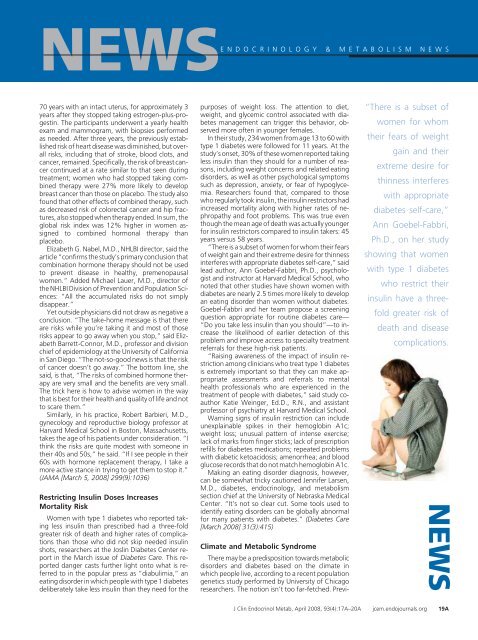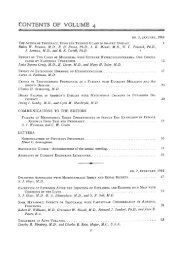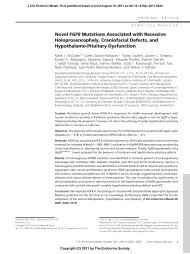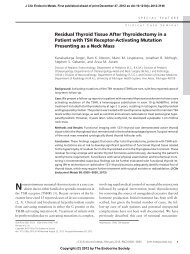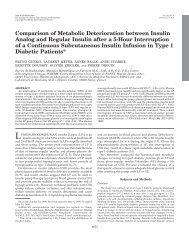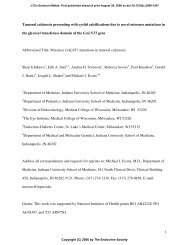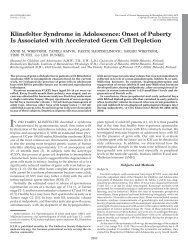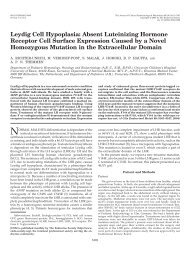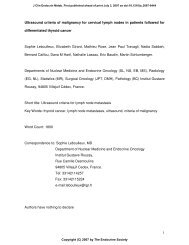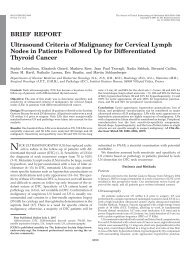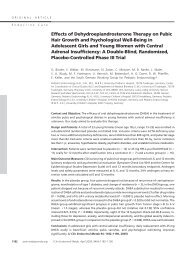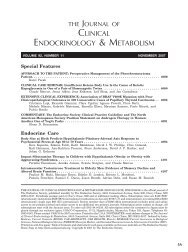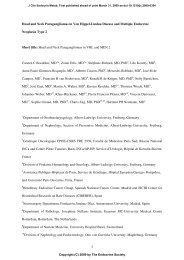NEWS - The Journal of Clinical Endocrinology & Metabolism
NEWS - The Journal of Clinical Endocrinology & Metabolism
NEWS - The Journal of Clinical Endocrinology & Metabolism
You also want an ePaper? Increase the reach of your titles
YUMPU automatically turns print PDFs into web optimized ePapers that Google loves.
NDOCRINOLOGY & METABOLISM <strong>NEWS</strong><br />
<strong>NEWS</strong>E<br />
70 years with an intact uterus, for approximately 3<br />
years after they stopped taking estrogen-plus-progestin.<br />
<strong>The</strong> participants underwent a yearly health<br />
exam and mammogram, with biopsies performed<br />
as needed. After three years, the previously established<br />
risk <strong>of</strong> heart disease was diminished, but overall<br />
risks, including that <strong>of</strong> stroke, blood clots, and<br />
cancer, remained. Specifically, the risk <strong>of</strong> breast cancer<br />
continued at a rate similar to that seen during<br />
treatment; women who had stopped taking combined<br />
therapy were 27% more likely to develop<br />
breast cancer than those on placebo. <strong>The</strong> study also<br />
found that other effects <strong>of</strong> combined therapy, such<br />
as decreased risk <strong>of</strong> colorectal cancer and hip fractures,<br />
also stopped when therapy ended. In sum, the<br />
global risk index was 12% higher in women assigned<br />
to combined hormonal therapy than<br />
placebo.<br />
Elizabeth G. Nabel, M.D., NHLBI director, said the<br />
article “confirms the study’s primary conclusion that<br />
combination hormone therapy should not be used<br />
to prevent disease in healthy, premenopausal<br />
women.” Added Michael Lauer, M.D., director <strong>of</strong><br />
the NHLBI Division <strong>of</strong> Prevention and Population Sciences:<br />
“All the accumulated risks do not simply<br />
disappear.”<br />
Yet outside physicians did not draw as negative a<br />
conclusion. “<strong>The</strong> take-home message is that there<br />
are risks while you’re taking it and most <strong>of</strong> those<br />
risks appear to go away when you stop,” said Elizabeth<br />
Barrett-Connor, M.D., pr<strong>of</strong>essor and division<br />
chief <strong>of</strong> epidemiology at the University <strong>of</strong> California<br />
in San Diego. “<strong>The</strong> not-so-good news is that the risk<br />
<strong>of</strong> cancer doesn’t go away.” <strong>The</strong> bottom line, she<br />
said, is that, “<strong>The</strong> risks <strong>of</strong> combined hormone therapy<br />
are very small and the benefits are very small.<br />
<strong>The</strong> trick here is how to advise women in the way<br />
that is best for their health and quality <strong>of</strong> life and not<br />
to scare them.”<br />
Similarly, in his practice, Robert Barbieri, M.D.,<br />
gynecology and reproductive biology pr<strong>of</strong>essor at<br />
Harvard Medical School in Boston, Massachusetts,<br />
takes the age <strong>of</strong> his patients under consideration. “I<br />
think the risks are quite modest with someone in<br />
their 40s and 50s,” he said. “If I see people in their<br />
60s with hormone replacement therapy, I take a<br />
more active stance in trying to get them to stop it.”<br />
(JAMA [March 5, 2008] 299(9):1036)<br />
Restricting Insulin Doses Increases<br />
Mortality Risk<br />
Women with type 1 diabetes who reported taking<br />
less insulin than prescribed had a three-fold<br />
greater risk <strong>of</strong> death and higher rates <strong>of</strong> complications<br />
than those who did not skip needed insulin<br />
shots, researchers at the Joslin Diabetes Center report<br />
in the March issue <strong>of</strong> Diabetes Care. This reported<br />
danger casts further light onto what is referred<br />
to in the popular press as “diabulimia,” an<br />
eating disorder in which people with type 1 diabetes<br />
deliberately take less insulin than they need for the<br />
purposes <strong>of</strong> weight loss. <strong>The</strong> attention to diet,<br />
weight, and glycemic control associated with diabetes<br />
management can trigger this behavior, observed<br />
more <strong>of</strong>ten in younger females.<br />
In their study, 234 women from age 13 to 60 with<br />
type 1 diabetes were followed for 11 years. At the<br />
study’s onset, 30% <strong>of</strong> these women reported taking<br />
less insulin than they should for a number <strong>of</strong> reasons,<br />
including weight concerns and related eating<br />
disorders, as well as other psychological symptoms<br />
such as depression, anxiety, or fear <strong>of</strong> hypoglycemia.<br />
Researchers found that, compared to those<br />
who regularly took insulin, the insulin restrictors had<br />
increased mortality along with higher rates <strong>of</strong> nephropathy<br />
and foot problems. This was true even<br />
though the mean age <strong>of</strong> death was actually younger<br />
for insulin restrictors compared to insulin takers: 45<br />
years versus 58 years.<br />
“<strong>The</strong>re is a subset <strong>of</strong> women for whom their fears<br />
<strong>of</strong> weight gain and their extreme desire for thinness<br />
interferes with appropriate diabetes self-care,” said<br />
lead author, Ann Goebel-Fabbri, Ph.D., psychologist<br />
and instructor at Harvard Medical School, who<br />
noted that other studies have shown women with<br />
diabetes are nearly 2.5 times more likely to develop<br />
an eating disorder than women without diabetes.<br />
Goebel-Fabbri and her team propose a screening<br />
question appropriate for routine diabetes care—<br />
“Do you take less insulin than you should”—to increase<br />
the likelihood <strong>of</strong> earlier detection <strong>of</strong> this<br />
problem and improve access to specialty treatment<br />
referrals for these high-risk patients.<br />
“Raising awareness <strong>of</strong> the impact <strong>of</strong> insulin restriction<br />
among clinicians who treat type 1 diabetes<br />
is extremely important so that they can make appropriate<br />
assessments and referrals to mental<br />
health pr<strong>of</strong>essionals who are experienced in the<br />
treatment <strong>of</strong> people with diabetes,” said study coauthor<br />
Katie Weinger, Ed.D., R.N., and assistant<br />
pr<strong>of</strong>essor <strong>of</strong> psychiatry at Harvard Medical School.<br />
Warning signs <strong>of</strong> insulin restriction can include<br />
unexplainable spikes in their hemoglobin A1c;<br />
weight loss; unusual pattern <strong>of</strong> intense exercise;<br />
lack <strong>of</strong> marks from finger sticks; lack <strong>of</strong> prescription<br />
refills for diabetes medications; repeated problems<br />
with diabetic ketoacidosis; amenorrhea; and blood<br />
glucose records that do not match hemoglobin A1c.<br />
Making an eating disorder diagnosis, however,<br />
can be somewhat tricky cautioned Jennifer Larsen,<br />
M.D., diabetes, endocrinology, and metabolism<br />
section chief at the University <strong>of</strong> Nebraska Medical<br />
Center. “It’s not so clear cut. Some tools used to<br />
identify eating disorders can be globally abnormal<br />
for many patients with diabetes.” (Diabetes Care<br />
[March 2008] 31(3):415)<br />
Climate and Metabolic Syndrome<br />
<strong>The</strong>re may be a predisposition towards metabolic<br />
disorders and diabetes based on the climate in<br />
which people live, according to a recent population<br />
genetics study performed by University <strong>of</strong> Chicago<br />
researchers. <strong>The</strong> notion isn’t too far-fetched. Previ-<br />
“<strong>The</strong>re is a subset <strong>of</strong><br />
women for whom<br />
their fears <strong>of</strong> weight<br />
gain and their<br />
extreme desire for<br />
thinness interferes<br />
with appropriate<br />
diabetes self-care,”<br />
Ann Goebel-Fabbri,<br />
Ph.D., on her study<br />
showing that women<br />
with type 1 diabetes<br />
who restrict their<br />
insulin have a threefold<br />
greater risk <strong>of</strong><br />
death and disease<br />
complications.<br />
<strong>NEWS</strong><br />
J Clin Endocrinol Metab, April 2008, 93(4):17A–20A jcem.endojournals.org 19A


